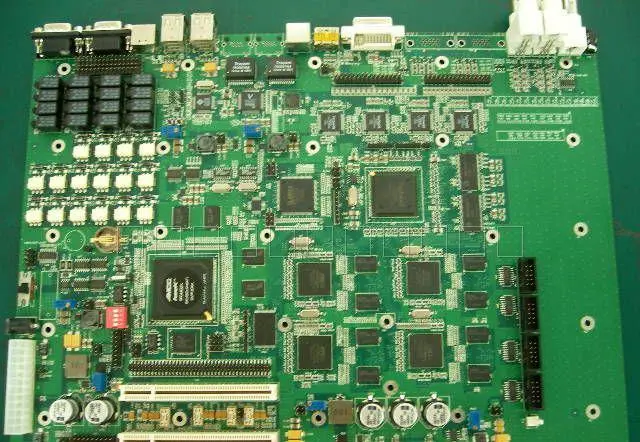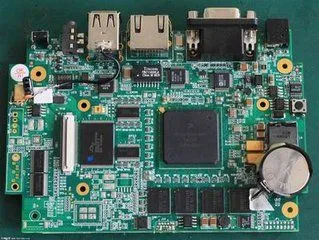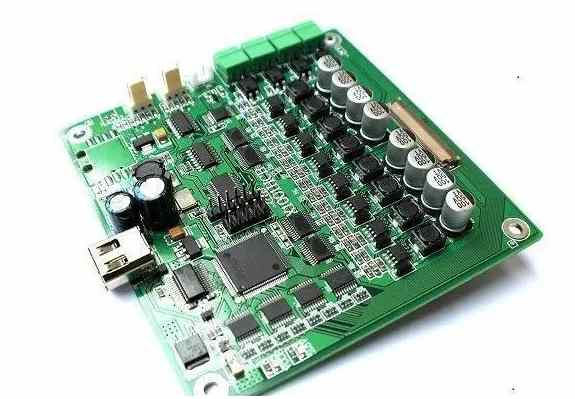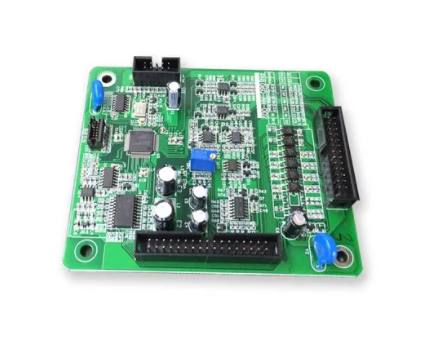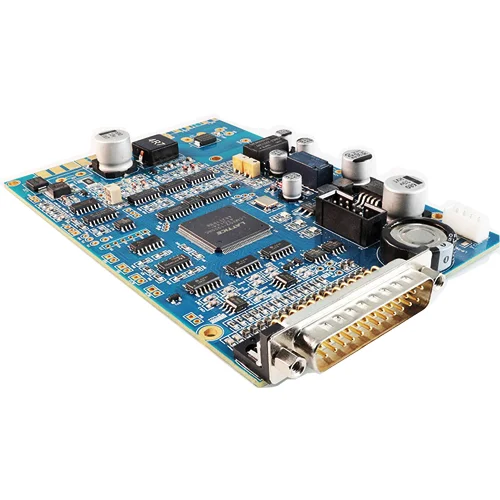
KingFord Shenzhen pcb production and pcb design factory explains to you that accThe US plans to expand restrictions on chip exports to China, and the Foreign Ministry respondsording to foreign media, the Biden government of the United States plans to expand the export restrictions of American chip companies to China. On the other hand, Micron, a chip giant, invested 15 billion dollars to build a new factory, which broke ground in Idaho on September 12.
According to Reuters on September 12, the new restrictions on artificial intelligence semiconductors and chip manufacturing tools in the United States will be based on the restrictions listed in the letter sent by the Biden government to Kolei Semiconductor, Fanlin Group and Applied Materials earlier this year. The restrictions earlier this year prohibited these companies from exporting semiconductor equipment to Chinese chip manufacturers using processes below 14 nanometers, unless they obtained permission from the U.S. Department of Commerce.
According to the report, the new restrictions that the Biden government is planning will also include the measures to ban Nvidia and AMD from delivering certain AI chips to China in August. It is reported that the implementation of broader restrictions on products containing target chips may affect some other large technology companies, including Intel, Dell Technology Group and Huiyou. In addition to the disclosed measures, other restrictions may also be added.

The spokesman of the US Department of Commerce declined to comment on the specific provisions, but reiterated that "comprehensive measures are being taken to implement additional actions to protect the national security and foreign policy interests of the US", including preventing China from acquiring US technology applicable to military modernization.
Micron Technologies, the largest memory chip company in the United States, opened a new $15 billion factory in Boise, Idaho, on September 12. This factory is planned to be put into operation in 2025, which is the first new memory chip factory built by Micron in the United States in 20 years.
The CEO of Micron said that the establishment of this factory benefited from the Chip and Technology Act recently passed by the United States. Micron will also establish another new factory in the United States. Both factories will produce DRAM chips widely used in data centers, personal computers and other equipment. After being put into operation, the DRAM output of Micron's factories in the United States will account for 40% of Micron's global output, higher than the current 10%. Meguiar previously said that it will invest 150 billion dollars in the next 10 years, of which 40 billion dollars will be invested in the United States.
Intel's long planned $20 billion chip factory in Ohio also officially broke ground recently. As a landmark event for the semiconductor industry to return to the United States, President Biden personally attended the commencement ceremony at the construction site and expressed congratulations.
Previously, due to the poor progress of the chip bill, Intel recently announced to postpone the planned groundbreaking ceremony, which was originally planned to be held at the end of July.
Intel said that this groundbreaking ceremony started the construction of "the largest silicon manufacturing base on the earth". In the next 10 years, Intel plans to invest 100 billion dollars in Ohio.
Recently, Wolfspeed, the power chip manufacturer, also announced to invest $5 billion to build a new semiconductor factory in North Carolina to produce chip raw materials used to power electric vehicles and other equipment, in response to the surge in demand.
According to Reuters, traditional power management chips are made of silicon, while silicon is also used to run microchips for computers and mobile phones, while Wolfspeed uses a relatively new silicon carbide material to make chips. Wolfspeed is considered to be the leader of this technology, and claims that its silicon carbide production accounts for more than 60% of the global total.
Silicon carbide power chips have won the favor of electric vehicle manufacturers because they can handle high voltage and save more electricity. Wolfspeed said that industry analysts estimate that this type of power chip will account for more than 20% of the power semiconductor market in 2027, while the current proportion is only 5%.
In addition, Wolfspeed said that the plant will be completed by 2030 and will become the largest silicon carbide material plant in the world. The initial capacity will be mainly used to meet its own chip manufacturing needs.
John Palmour, chief technology officer of Wolfspeed, said that earlier this year, Wolfspeed opened the world's first 200mm silicon carbide manufacturing plant in Mohawk Valley, New York, and is selecting a site for another large factory.
"The new material factory will actually eventually increase our silicon carbide wafer manufacturing capacity by about 13 times," Palmour added.
Palmour also said that the first phase of the plant is planned to be completed in 2024, with an investment of about US $2 billion, but the total investment may reach US $5 billion. As a result, Wolfspeed will apply for federal funding related to the recently passed Chip and Science Act.
Texas Instruments began building its new large chip manufacturing plant in Texas in May this year. The new chip factory will be constructed in four stages. The first wafer factory will be put into operation in 2025, which will be the largest economic project in Texas history. It will cost Texas Instruments about 30 billion dollars, and the whole time span will span ten years. However, the Texas government plans to reduce 90% of the property tax in the first 30 years of the factory to encourage investment in Texas Instruments.
Global Foundries intends to build a new chip factory in New York, but it will not set foot in the advanced process, and the highest is the 12nm process. At present, Grofand has not disclosed the specific situation of the new chip factory in New York, but in the past, it will still work on 14nm, 12nm and improved versions. Grofand's process is the process used by many companies in the United States, and there is also a lot of cooperation with the U.S. military. After all, it is a local chip manufacturer in the United States, and the U.S. military also uses a lot of Grofand's chips.
The CEO of Ansonmei once said that the "Chip Act" has injected confidence into the manufacturing industry in North America.
In early August, the ribbon cutting of the Silicon Carbide (SiC) factory in Hudson, New Hampshire was completed. It is reported that this base will increase the SiC wafer production capacity of Ansome by five times year on year by the end of 2022. This expansion enables Ansenmei to fully control the SiC manufacturing supply chain, including the purchase of SiC powder and graphite raw materials, and the delivery of packaged SiC devices.
Simon Keeton, Executive Vice President and General Manager of the Power Solutions Department of Ansomy, said that in order to achieve the growth of substrate capacity, we have expanded to the second building and plan to continue to improve to provide customers with SiC wafers.
According to the official micro blog of Ansonmei, Ansonmei is the only large-scale supplier with the capability of supplying SiC and insulated gate bipolar transistor (IGBT) solutions end-to-end. On the second quarter financial report conference call last week, the company announced that it had committed to achieving $4 billion of SiC revenue in the next three years by signing long-term supply agreements with a wide range of customer groups.
The Ministry of Foreign Affairs responded:
At the regular press conference of the Ministry of Foreign Affairs of China held on September 13, Mao Ning, the spokesman, said in response to relevant questions from reporters that the United States was totally technological hegemonism in doing so. The United States is trying to use its scientific and technological advantages to curb and suppress emerging markets and developing countries. What the United States says is "fair competition, based on rules", but what it does is "the United States first, strength first". The United States just hopes to control the vast number of developing countries, including China, at the low end of the industrial chain forever, which is not constructive.
Xiang Ligang, a senior observer in the communications industry, said in an interview with the Global Times that in the short term, the restrictions of the United States will interfere with China's establishment of 14 nm and below chip production lines, causing Chinese enterprises to delay or even fail to buy relevant chip production equipment, which will have a realistic impact on China. However, due to the suppression of the United States, China's chip industry is also committed to building production capacity based on independent scientific research technology. High end GPUs (graphics processors) are prohibited from exporting to China, which will have a certain impact on China's artificial intelligence, high-performance computing and other aspects in the short term. However, there are about 20 enterprises in China that have designed and developed GPUs. From this perspective, US export restrictions also mean that US enterprises give up these markets to rapidly developing Chinese enterprises.
It is reported that since President Biden signed the Chip and Science Act to provide US $52 billion in support for the local semiconductor manufacturing industry, a series of companies have announced plans to manufacture chips in the United States.


